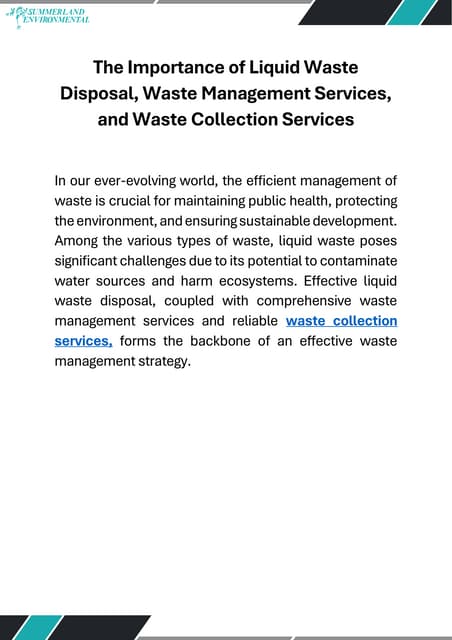The 4-Minute Rule for Reclaim Waste
The 4-Minute Rule for Reclaim Waste
Blog Article
The Single Strategy To Use For Reclaim Waste
Table of Contents9 Simple Techniques For Reclaim WasteLittle Known Questions About Reclaim Waste.Unknown Facts About Reclaim WasteThe Only Guide for Reclaim WasteThe Definitive Guide to Reclaim Waste
Domestic sewer waste refers to the waste and products from a property septic tank. The proper administration and disposal of residential sewage waste need fluid waste to be transferred to a sewer therapy plant where the correct methods and tools are used to purify and dispose of waste.
Industrial waste frequently consists of possible risks, such as combustible materials or a mixture of liquid and solid waste items, and calls for a more sophisticated and detailed disposal process. The disposal of industrial waste commonly involves the filtering of waste prior to transport to make certain safe and proper disposal. Hazardous waste is developed from byproducts and drainage of industrial processes and manufacturing.
This sort of waste can not use the same sewage administration transportation or processes as septic or industrial liquids. The hazardous waste monitoring process needs the evaluation and testing of liquid waste before it undergoes the disposal process (industrial wastewater treatment). Drainage waste is the fluid waste that originates from overflow and excess stormwater in extremely inhabited areas or cities
Runoff waste can cause contamination and flooding if not dealt with correctly. Ensuring proper waste management can stop calamities and lower ecological damage.
Reclaim Waste Can Be Fun For Everyone
Contact PROS Providers today to learn more about our waste monitoring and disposal services and the appropriate ways to take care of the fluid waste you generate.
(https://www.awwwards.com/reclaimwaste1/)Do you recognize what occurs to your water when you disengage, purge the toilet or drain the cleaning maker? No? Well, it's worth recognizing. This so-called 'wastewater' is not just an essential resource yet, after treatment, will certainly be released to our land, rivers or the ocean. Utilized water from toilets, showers, bathrooms, kitchen sinks, washings and industrial procedures is recognized as wastewater.

water made use of to cool down machinery or tidy plant and devices). Stormwater, a form of wastewater, is overflow that moves from agricultural and city areas such as roofings, parks, yards, roads, paths and rain gutters right into stormwater drains, after rain. Stormwater moves neglected straight to local creeks or rivers, ultimately getting to the sea.
More About Reclaim Waste
In Queensland, a lot of wastewater is treated at sewage treatment plants. Wastewater is carried from residential or industrial sites through a system of sewers and pump stations, known as sewage reticulation, to a sewer therapy plant.
The Department of Natural Resources encourages city governments about handling, operating and keeping sewage systems and treatment plants. In unsewered areas, regional federal governments may need homeowners to set up private or family sewage treatment systems to treat domestic wastewater from bathrooms, kitchens, washrooms and laundries. The Department of Natural Resources authorises making use of home systems when they are confirmed to be effective.
In some new neighborhoods, therapy of some stormwater to get rid of litter, sand and crushed rock has begun utilizing gross toxin catches. Wastewater therapy happens in 4 stages: Removes strong matter.
Utilizes tiny living organisms recognizes as micro-organisms to damage down and get rid of staying liquified wastes and great particles. Micro-organisms and wastes are incorporated in the sludge.
Little Known Facts About Reclaim Waste.
Nutrient removal is not available at all sewage treatment advice plants because it calls for expensive specialised devices. Clear liquid effluent generated after treatment may still have disease-causing micro-organisms - industrial wastewater treatment.

This normally indicates wastewater needs to be dealt with or impurities eliminated before it can be released to waterways. Many wastewater flows right into the sewerage system. Under the Act, city governments provide approvals and permits for ecologically relevant tasks (Ages) entailing wastewater launches that might have a local influence. The division administers authorizations and licences to Periods including wastewater releases that may have a regional or statewide influence.
Excitement About Reclaim Waste
Tracking supplies valid details about water quality and can confirm that licence conditions are being satisfied. The details obtained through monitoring gives the basis for making water top quality choices.
Report this page